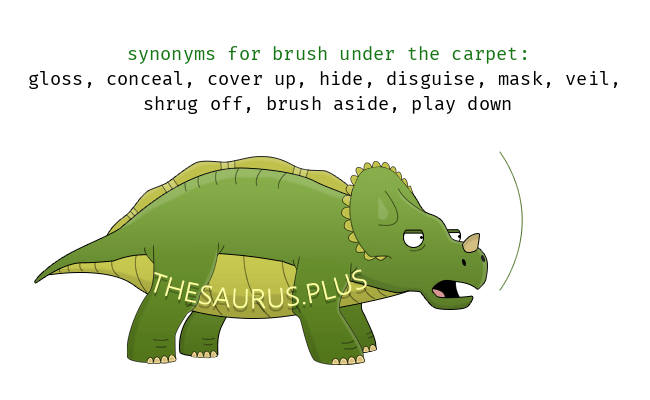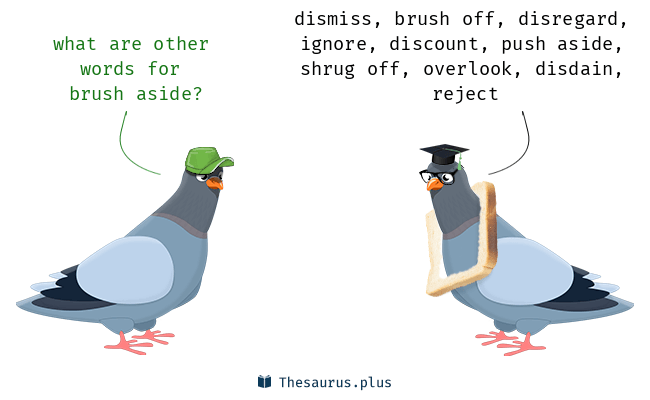
Sweep something under the carpet
UK (US sweep sth under the rug)
To hide a problem or try to keep it secret instead of dealing with it:
The committee is being accused of sweeping financial problems under the carpet to avoid embarrassment.
Cambridge Dictionary


1 Dead End: An investigation gone wrong – The Fifth Estate
Back to menu
2 The true injustice of wrongful conviction | Jeffrey Deskovic | TEDxMarthasVineyard
Back to menu
Gepubliceerd op 24 nov. 2015
The expression “brushing under the carpet” typically refers to the act of deliberately avoiding or ignoring a problem or issue, often in an attempt to hide or avoid dealing with its consequences. The key points of this expression are:
Avoidance: The act of avoiding or ignoring a problem or issue rather than addressing it directly. It may involve neglecting to acknowledge or confront a difficult situation, hoping it will go away on its own or be forgotten.
Concealment: The idea of hiding or covering up a problem or issue, similar to sweeping dirt under a carpet to make it less visible. It can involve avoiding discussions or actions that would bring the problem to light or keeping it out of public view.
Consequences: The implication that avoiding or ignoring a problem or issue may lead to negative consequences in the long run. It can result in the problem festering or worsening over time, potentially causing more harm or damage that could have been prevented by addressing it promptly.
Lack of accountability: The notion that “brushing under the carpet” can indicate a lack of responsibility or accountability for dealing with an issue. It may involve shirking responsibility or passing the burden onto others, avoiding taking ownership of the problem or issue at hand.
Inauthenticity: The idea that “brushing under the carpet” can be perceived as insincere or disingenuous. It may suggest a lack of transparency or authenticity in dealing with problems, avoiding honest and open communication or actions to address the issue effectively.
Overall, the key points of the expression “brushing under the carpet” revolve around avoidance, concealment, potential consequences, lack of accountability, and inauthenticity in dealing with problems or issues. It conveys the notion that avoiding or ignoring problems may have negative consequences and is generally not a responsible or authentic approach to addressing challenges.
3 Wrongful Conviction: How a false confession led to a 16-year prison sentence for an innocent teen
14 apr 2023 TRUE CRIME DAILY: The Podcast
This Week on True Crime Daily The Podcast: Jeffrey Descovic was only a teenager when he was coerced into a false confession for the brutal assault and murder of a classmate. After 16 years behind bars, DNA evidence exonerated him and revealed the real killer had taken another victim.
Jeffrey Deskovic & Jia Wertz join Ana Garcia.
4 How I was Wrongfully Convicted of Rape & Murder | Jeffrey Deskovic
In première gegaan op 6 jul 2022 KONCRETE Podcast S1 A144
Jeffrey Deskovic was wrongfully convicted of the murder of a classmate at the age of 17 and spent half of his life in prison for a crime he did not commit. Jeffrey was finally exonerated 16 years later
Watch Part 2 – ![]() • How Spending My Childhood in a Maximu… Watch Part 3 –
• How Spending My Childhood in a Maximu… Watch Part 3 – ![]() • Is $24 Million Enough Money for 16 Ye…
• Is $24 Million Enough Money for 16 Ye…
5 How Spending My Childhood in a Maximum Security Prison Changed Me | Jeffrey Deskovic
6 Is $24 Million Enough Money for 16 Years in Prison? | Jeffrey Deskovic
Jeffrey Deskovic is a prominent figure in the realm of wrongful convictions in the United States. He was wrongfully convicted of rape and murder in 1990 at the age of 16 in Peekskill, New York. Deskovic’s case is a poignant example of a flawed criminal justice system that can lead to the wrongful conviction of innocent individuals. Here are the key points of Jeffrey Deskovic’s wrongful conviction case:
Crime and Arrest: Jeffrey Deskovic was wrongfully convicted in 1990 for the rape and murder of a classmate, 15-year-old Angela Correa, in Peekskill, New York.
Police Interrogation: Deskovic was subjected to a lengthy and coercive interrogation by law enforcement officers, during which he was coerced into confessing to the crime, despite being innocent.
Incriminating Evidence: The false confession obtained during the interrogation was a key piece of evidence used against Deskovic during his trial. DNA evidence found at the crime scene did not match Deskovic’s, but this crucial fact was overlooked during the investigation and trial.
Trial and Conviction: Despite the lack of physical evidence connecting Deskovic to the crime, he was convicted based on the false confession and other circumstantial evidence.
Imprisonment: Deskovic was sentenced to 15 years to life in prison, serving nearly 16 years for a crime he did not commit.
Post-Conviction Exoneration: In 2002, DNA testing finally proved Deskovic’s innocence, leading to his exoneration and release from prison.
Advocacy and Foundation: Following his release, Deskovic founded “The Jeffrey Deskovic Foundation for Justice,” a nonprofit organization dedicated to preventing wrongful convictions, aiding exonerees, and advocating for criminal justice reform.
Impact and Reforms: Deskovic’s case shed light on the flaws within the criminal justice system, including coercive interrogations, tunnel vision by law enforcement, and the need for improved forensic testing and evidence preservation. His advocacy has contributed to reforms aimed at preventing wrongful convictions and promoting criminal justice reform.
Jeffrey Deskovic’s story serves as a cautionary tale about the importance of due process, proper legal representation, and the need for ongoing efforts to prevent wrongful convictions and miscarriages of justice.
7 This is How Much You Get Paid for a Wrongful Conviction | Jeffrey Deskovic
Jeffrey Deskovic was wrongfully convicted of the murder of a classmate at the age of 17 and spent half of his life in prison for a crime he did not commit. Jeffrey was finally exonerated 16 years later based on DNA evidence.
8 The Only Way to Stop Wrongful Convictions | Jeffrey Deskovic
Back to menu IMPORTANT CONTENT
9 Dog Switch Prank
3 mei 2011
Does anyone still believe that the US legal system has anything to do with truth, or safety of society, or even punishment? Get that clear guys, the american prison system is an industry, and people are the raw material. They just have to keep the prisons full to keep the cash flowing. It is totally irrellevant if someone is guilty or not. If you have bad luck, you get convicted, regardless of what you did or did not do. And as long as there are companies making profit from this system, it’s not going to change. But hey, thats capitalism in its purest form. So in essence, this is the american way of life, right there.